A trade truce would help
Easy money to the rescue
Are consumers too divided to agree on a recession?
Best economy ever? Not exactly
https://www.cnn.com/2019/10/31/investing/economy-recession-slowdown/index.html
2019-10-31 12:09:00Z
52780421458907
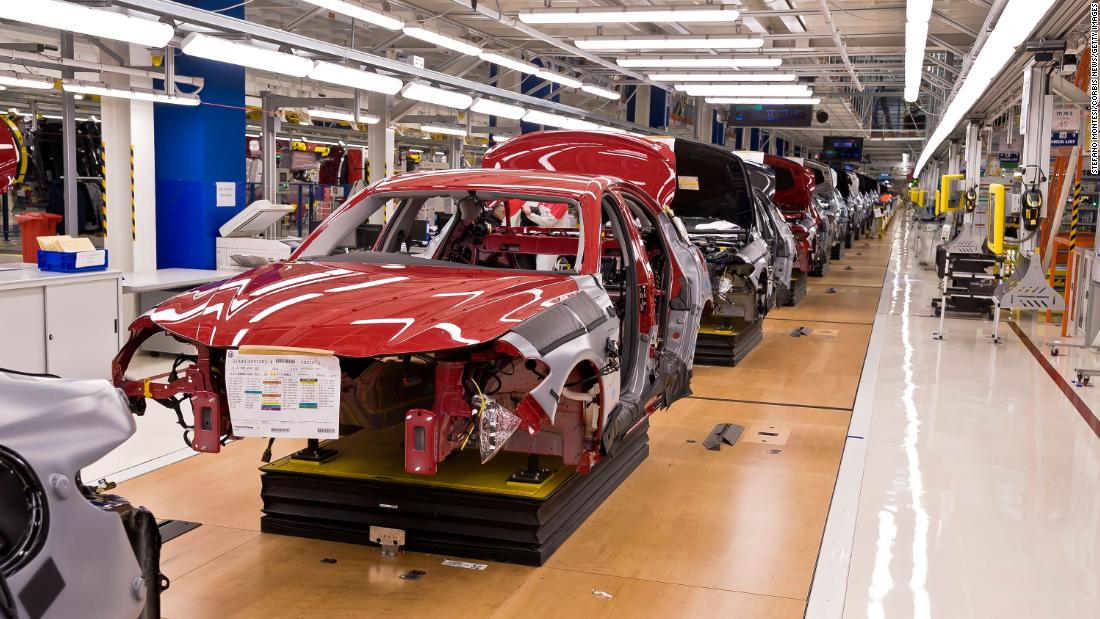


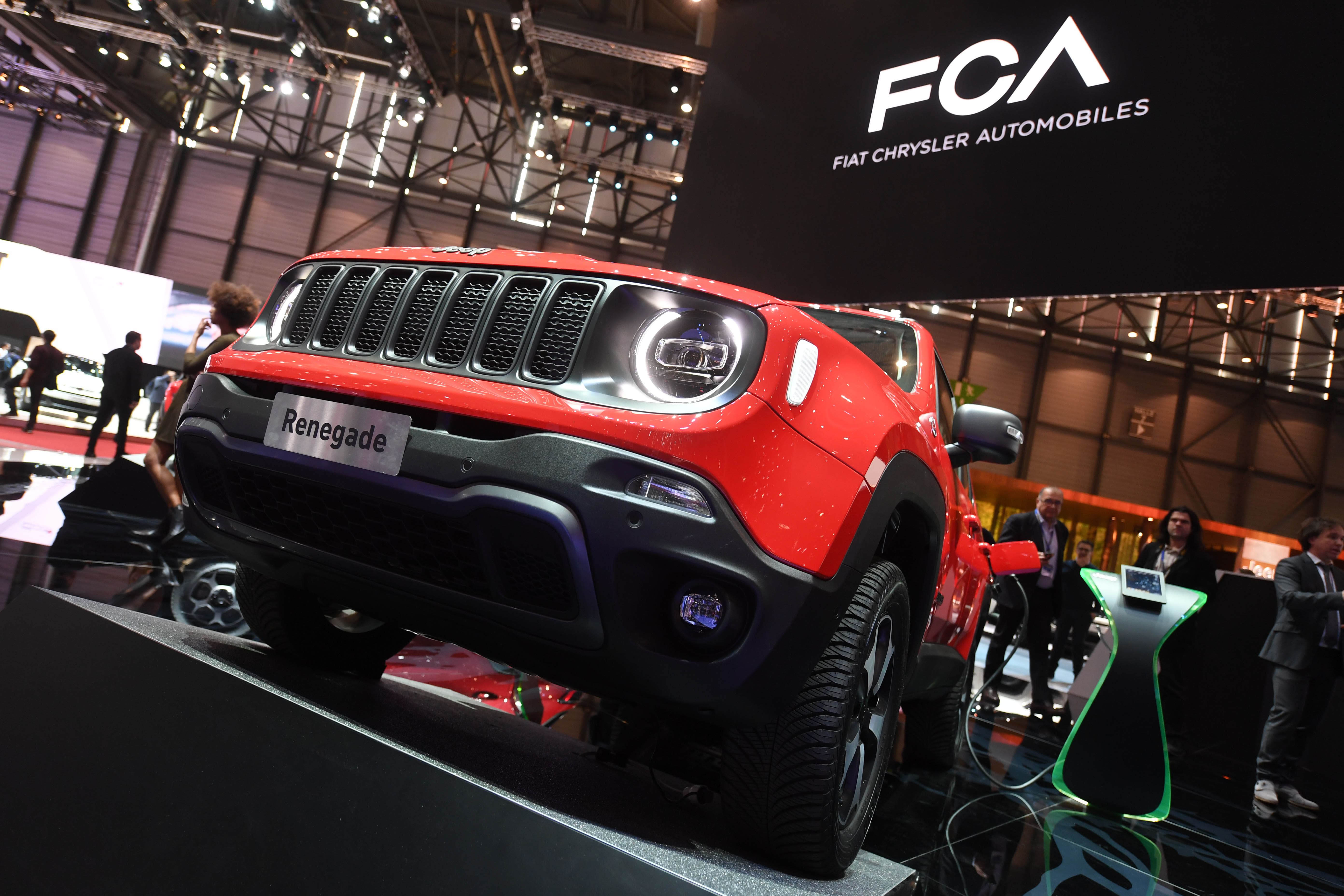
A Jeep Renegade 4x4 e is presented at the Geneva Motor Show March 5, 2019. Signage in the background says"'FCA Fiat Chrysler Automobiles," to which Jeep belongs.
Uli Deck | picture alliance | Getty Images
Peugeot (PSA) and Fiat Chrysler (FCA) confirmed their intention to merge on Thursday, in what would be a 50-50 share swap and create the world's fourth-largest carmaker.
The new company's shares will be listed in New York, Paris and Milan with FCA's John Elkann becoming the chairman and Peugeot's Carlos Tavares becoming the CEO.
"Discussions have opened a path to the creation of a new group with global scale and resources owned 50% by Groupe PSA shareholders and 50% by FCA shareholders," they said in a statement.
"In a rapidly changing environment, with new challenges in connected, electrified, shared and autonomous mobility, the combined entity would leverage its strong global R&D footprint and ecosystem to foster innovation and meet these challenges with speed and capital efficiency."
The PSA board approved the merger and the Fiat Chrysler board met Wednesday. Executives have briefed regulators in the U.S. and France, the Wall Street Journal reported, citing unnamed sources.
Reports of the talks, including a potential "all-share merger of equals," as the Wall Street Journal first reported, sent shares of Fiat Chrysler surging as much as 8% on Tuesday. The stock rose by less than 2% in midday trading Wednesday.
The confirmation of the deal comes about five months after Fiat Chrysler ended merger discussions with PSA's French rival, Renault. However, this new merger is unlikely to face the same interference from the French government, a source told CNBC.
—CNBC's Michael Wayland and Phil LeBeau contributed to this article.

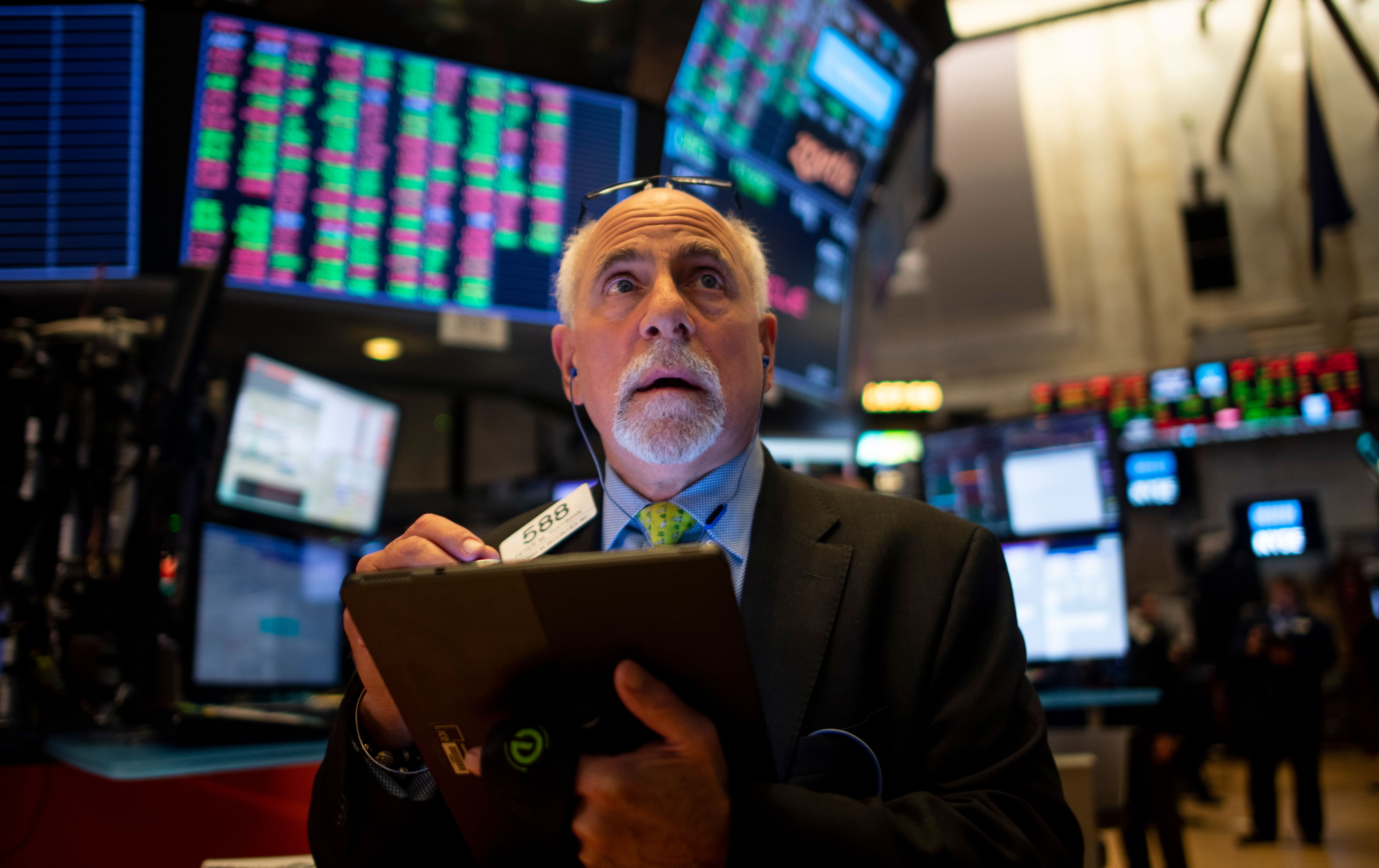
Check out the companies making headlines before the bell:
General Electric – General Electric reported quarterly profit of 15 cents per share, 4 cents a share above estimates. Revenue also exceeded forecasts and GE raised its full-year cash flow forecast.
Yum Brands – Yum earned an adjusted 80 cents per share for its latest quarter, 14 cents a share shy of consensus forecasts. Revenue also came in below estimates, hurt by a weaker-than-expected performance at its Pizza Hut and KFC units.
Anixter International – The software company agreed to be acquired by private-equity firm Clayton, Dubilier & Rice for $81 per share in cash. The total value of the deal is $3.8 billion including assumed debt, with the transaction expected to close by the end of 2020's first quarter.
Molson Coors – The beer brewer fell a penny a share short of estimates, with quarterly profit of $1.48 per share. Revenue also came in short of forecasts and Molson Coors announced a restructuring that will slash up to 500 jobs.
Garmin – The GPS and fitness device maker earned $1.19 per share for its latest quarter, well above the 95 cents a share consensus estimate. Revenue also topped forecasts. Garmin saw better-than-expected results in all its units, as well as higher-than-expected profit margins.
Tupperware – Tupperware earned an adjusted 43 cents per share, well short of the 62 cents a share consensus estimate. The housewares maker's revenue also came in short of forecasts. The company said it was experiencing challenging trends in markets like the U.S., China, Canada, and Brazil. Tupperware also cut its full-year earnings outlook.
Johnson & Johnson – J&J said its testing found no asbestos in its Johnson's Baby Powder. That testing included a single bottle that the Food and Drug Administration had said contained trace amounts of asbestos, prompting J&J to recall a lot of 33,000 bottles earlier this month.
Fiat Chrysler – Fiat Chrysler said it was in talks about a possible merger with Peugeot maker PSA that could create a combined company worth about $50 billion. Fiat Chrysler had abandoned talks earlier this year to merge with France's Renault.
Amgen – Amgen reported quarterly profit of $3.66 per share, 13 cents a share above estimates. The biotech company's revenue also beat forecasts and Amgen raised its full-year guidance amid strong sales of its biosimilar drugs.
Electronic Arts – Electronic Arts reported quarterly profit of 96 cents per share, 10 cents a share above estimates. The video game maker's revenue also topped estimates. Electronic Arts saw stronger digital sales, including game downloads and in-game purchases.
Mattel – Mattel came in 10 cents a share above estimates, with quarterly profit of 26 cents per share. The toy maker's revenue was slightly above Wall Street forecasts. Mattel also said it is restating some past earnings following an internal investigation into accounting issues, and the company's chief financial officer is resigning.
Mondelez International – Mondelez reported quarterly profit of 64 cents per share, 4 cents a share above estimates. Revenue was slightly above forecasts. The snack maker raised its full-year outlook, as sales volume increases across its major markets.
FireEye – FireEye raised its annual revenue guidance, after doubling estimates by reporting quarterly profit of 2 cents per share. The cybersecurity company's revenue also beat forecasts as it sold more cloud subscriptions.
Advanced Micro Devices – AMD reported adjusted earnings of 18 cents per share, in line with Street forecasts. Revenue was very slightly below estimates, although the chipmaker reported better-than-expected results for its data center business.
Yum China – Yum China beat analyst estimates by 3 cents A share, with quarterly profit of 58 cents per share. The restaurant operator's revenue was below forecasts, however, as were comparable-restaurant sales at KFC, Pizza Hut, and Taco Bell.
Sony – Sony reported its best-ever second-quarter profit, driven by strong sales of its image sensors. Sales helped offset a drop in earnings from Sony's gaming division.
Edison International – Edison's Southern California Edison unit said its equipment will likely be found to have been associated with a 2018 California wildfire that damaged more than 1,000 homes in Los Angeles and Ventura counties.
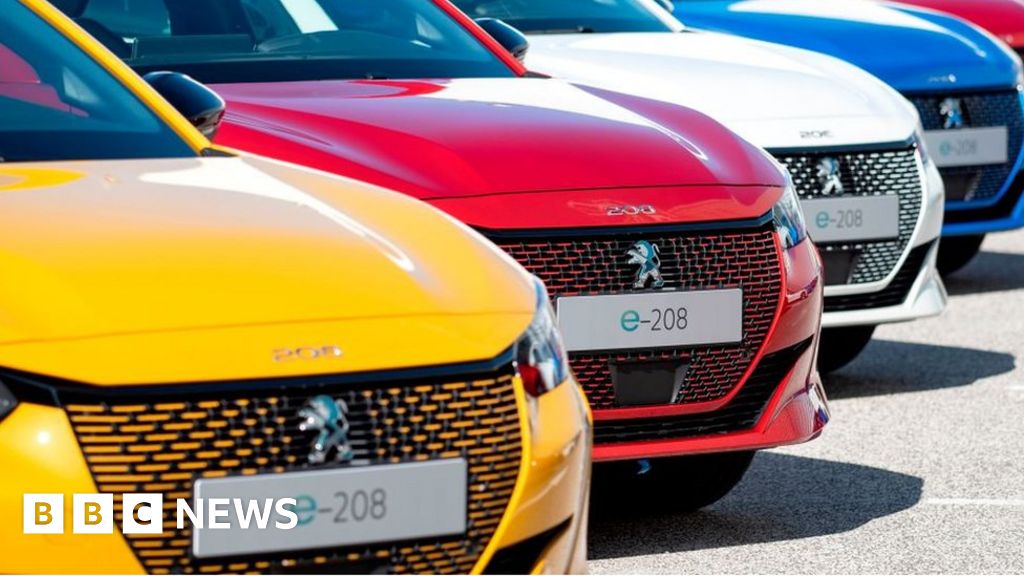
PSA Group, the French owner of Peugeot, is exploring a merger with its US-Italian rival Fiat Chrysler, it has confirmed.
A deal between the two carmakers would create a business with a combined market value of nearly $50bn (£39.9bn).
This is Fiat Chrysler's second attempt at a merger this year after it pulled out of an agreement with Renault in June.
Fiat Chrysler shares jumped 7.5% on Wall Street.
The potential merger would face significant political and financial hurdles.
Discussions remain in the early stages and there is no guarantee of a final deal.
However, if the two companies do combine, PSA chief executive Carlos Tavares is expected to lead the enlarged group.
John Elkann, Fiat Chrysler's chairman and the head of Italy's Agnelli industrial dynasty which controls the business, would retain the same position at the new company.
A merger of the two groups would bring a number of brands under one roof including Alfa Romeo, Citroen, Jeep, Opel, Peugeot and Vauxhall.
The talks come months after a proposed tie-up between Fiat Chrysler and French carmaker Renault collapsed.
Fiat Chrysler had described its bid for Renault as a "transformative" proposal that would create a global automotive leader.
Industry shifts toward electric models, along with stricter emissions standards and the development of new technologies for autonomous vehicles, have put increasing pressure on carmakers to consolidate.

PSA Group, the French owner of Peugeot, is exploring a merger with its US-Italian rival Fiat Chrysler, it has confirmed.
A deal between the two carmakers would create a business with a combined market value of nearly $50bn (£39.9bn).
This is Fiat Chrysler's second attempt at a merger this year after it pulled out of an agreement with Renault in June.
Fiat Chrysler shares jumped 7.5% on Wall Street.
The potential merger would face significant political and financial hurdles.
Discussions remain in the early stages and there is no guarantee of a final deal.
However, if the two companies do combine, PSA chief executive Carlos Tavares is expected to lead the enlarged group.
John Elkann, Fiat Chrysler's chairman and the head of Italy's Agnelli industrial dynasty which controls the business, would retain the same position at the new company.
A merger of the two groups would bring a number of brands under one roof including Alfa Romeo, Citroen, Jeep, Opel, Peugeot and Vauxhall.
The talks come months after a proposed tie-up between Fiat Chrysler and French carmaker Renault collapsed.
Fiat Chrysler had described its bid for Renault as a "transformative" proposal that would create a global automotive leader.
Industry shifts toward electric models, along with stricter emissions standards and the development of new technologies for autonomous vehicles, have put increasing pressure on carmakers to consolidate.

PSA Group, the French owner of Peugeot, is exploring a merger with its US-Italian rival Fiat Chrysler, it has confirmed.
A deal between the two carmakers would create a business with a combined market value of nearly $50bn (£39.9bn).
This is Fiat Chrysler's second attempt at a merger this year after it pulled out of an agreement with Renault in June.
Fiat Chrysler shares jumped 7.5% on Wall Street.
The potential merger would face significant political and financial hurdles.
Discussions remain in the early stages and there is no guarantee of a final deal.
However, if the two companies do combine, PSA chief executive Carlos Tavares is expected to lead the enlarged group.
John Elkann, Fiat Chrysler's chairman and the head of Italy's Agnelli industrial dynasty which controls the business, would retain the same position at the new company.
A merger of the two groups would bring a number of brands under one roof including Alfa Romeo, Citroen, Jeep, Opel, Peugeot and Vauxhall.
The talks come months after a proposed tie-up between Fiat Chrysler and French carmaker Renault collapsed.
Fiat Chrysler had described its bid for Renault as a "transformative" proposal that would create a global automotive leader.
Industry shifts toward electric models, along with stricter emissions standards and the development of new technologies for autonomous vehicles, have put increasing pressure on carmakers to consolidate.

PSA Group, the French owner of Peugeot, is exploring a merger with its US-Italian rival Fiat Chrysler, it has confirmed.
A deal between the two carmakers would create a business with a combined market value of nearly $50bn (£39.9bn).
This is Fiat Chrysler's second attempt at a merger this year after it pulled out of an agreement with Renault in June.
Fiat Chrysler shares jumped 7.5% on Wall Street.
The potential merger would face significant political and financial hurdles.
Discussions remain in the early stages and there is no guarantee of a final deal.
However, if the two companies do combine, PSA chief executive Carlos Tavares is expected to lead the enlarged group.
John Elkann, Fiat Chrysler's chairman and the head of Italy's Agnelli industrial dynasty which controls the business, would retain the same position at the new company.
A merger of the two groups would bring a number of brands under one roof including Alfa Romeo, Citroen, Jeep, Opel, Peugeot and Vauxhall.
The talks come months after a proposed tie-up between Fiat Chrysler and French carmaker Renault collapsed.
Fiat Chrysler had described its bid for Renault as a "transformative" proposal that would create a global automotive leader.
Industry shifts toward electric models, along with stricter emissions standards and the development of new technologies for autonomous vehicles, have put increasing pressure on carmakers to consolidate.

Facebook-owned WhatsApp has filed a lawsuit against Israel's NSO Group, alleging the firm was behind cyber-attacks that infected devices with malicious software.
WhatsApp accuses the company of sending malware to roughly 1,400 mobile phones for the purposes of surveillance.
Users affected included journalists, human rights activists, political dissidents, and diplomats.
NSO Group, which makes software for surveillance, disputed the allegations.
In a court filing, WhatsApp said NSO Group "developed their malware in order to access messages and other communications after they were decrypted on target devices".
It said NSO Group created various WhatsApp accounts and caused the malicious code to be transmitted over the WhatsApp servers in April and May.
"We believe this attack targeted at least 100 members of civil society, which is an unmistakable pattern of abuse," WhatsApp said in a statement.
The affected users had numbers from several countries, including Bahrain, the United Arab Emirates and Mexico, according to the lawsuit.
WhatsApp said it is seeking a permanent injunction banning NSO from using its service.
The firm, which was acquired by Facebook in 2014, said it was the first time an encrypted messaging provider had taken legal action of this kind.
WhatsApp promotes itself as a "secure" communications app because messages are end-to-end encrypted. This means they should only be displayed in a legible form on the sender or recipient's device.
NSO Group said it would fight the allegations.
"In the strongest possible terms, we dispute today's allegations and will vigorously fight them," the company said in a statement to the BBC.
"The sole purpose of NSO is to provide technology to licensed government intelligence and law enforcement agencies to help them fight terrorism and serious crime."

Mary Barra, Chairman and CEO of General Motors.
Bill Pugliano | Getty Images
General Motors on Tuesday beat Wall Street expectations for the third-quarter but lowered its guidance for the year due to the United Auto Workers' 40-day strike against the automaker.
The cost of the strike, $1 billion for the quarter and $3.8 billion for the year, was substantially higher than previously estimated and prompted GM to lower its earnings guidance for the year.
It now expects to earn between $4.50 and $4.80 per share, down from its previous forecast of between $6.50 and $7 per share. It also lowered its automotive adjusted free cash flow to a range of zero and $1 billion, down from $4.5 billion and $6 billion.
Here's what GM reported Wednesday compared to Wall Street's expectations, according to Refinitiv consensus estimates:
The strike shaved 52 cents per share off the automaker's third-quarter earnings. Revaluations of its stake in Lyft and warrants from French automaker PSA Group took another 15 cents per share off its earnings.
The company's shares were up by less than 1% in pre-market trading.
Wall Street analysts estimated the national work stoppage – the longest since 1970 against GM – cost the automaker more than $2 billion in lost production.
The strike ended on Friday with ratification of a new contract for GM's 48,000 union workers. The deal included pay raises, lump-sum bonuses and $11,000 ratification bonuses for most workers, among other benefits.
In August, prior to the strike, GM reconfirmed its full-year guidance for earnings per share of $6.50 to $7.00 per share. The company touts it has beat Wall Street estimates for 17-consecutive quarters.
Shares of GM have almost fully recovered from double-digit declines during the strike. The stock closed Monday at $36.64, down about 6% since before the strike started on Sept. 16.
This is breaking news. Please check back for updates.

SYDNEY, Australia — Australian regulators on Tuesday accused Google of misleading consumers about its collection of their personal location information through its Android mobile operating system, the latest government action against a tech company over its handling of vast quantities of user data.
The Australian Competition and Consumer Commission alleged in a lawsuit that Google falsely led users to believe that disabling the “Location History” setting on Android phones would stop the company from collecting their location data. But users were actually required to also turn off a second setting, “Web and App Activity,” that was enabled by default.
Google did not properly disclose the need to disable both settings from January 2017 until late 2018, the suit alleges. The company changed its user guidance after The Associated Press revealed in August 2018 that it was continuing to collect the data even after the Location History setting was switched off.
The commission also said that while Google made it clear to users what features they would lose by turning off location services, the company did not inform them adequately about what it would do with the data collected.
“This is part of a system of not being able to make informed choices about what’s being done with your data,” said Rod Sims, the commission’s chairman.
Mr. Sims called the lawsuit the first of its kind by a national government against a tech company over its use of personal data. The agency is seeking what he called significant financial penalties against Google, among other corrective measures. He added that he hoped the case would raise awareness among consumers over how much data is being collected.
“We need to be getting ahead of them, because this is a whole new world,” he said of data collection issues.
A Google spokeswoman said in a statement that the company was reviewing the allegations. She said Google would continue to engage with the commission over its concerns but intended to defend itself.
The action by Australian regulators comes as governments and consumer groups around the world have expressed growing concern about the power of tech companies, including their collection of personal data from devices that are indispensable to the lives of billions of people.
Consumer groups from several European countries had already sued Google over the location tracking issue under a comprehensive data privacy law adopted in Europe last year. Under that law, a French agency fined Google 50 million euros, or about $55 million, in January for not properly disclosing to users how it collected data to create personalized ads.
In the United States, regulators approved a $5 billion fine against Facebook this year over its role in allowing Cambridge Analytica, a political data firm hired by President Trump’s 2016 election campaign, to gain access to private information on more than 50 million Facebook users.
While Google has made changes to Android in later iterations that limit the location data it gathers, the business incentives for collecting as much personal data as possible remain great. Location-targeted advertising is worth an estimated $21 billion a year, and Google, along with Facebook, dominates the mobile ad market.
The Australian lawsuit is in part the product of a 19-month investigation by the consumer commission into the market power of Google and Facebook. It issued 23 recommendations, including an overhaul of privacy laws, to limit their reach and force them to take more responsibility for the content they disseminate.
The Australian government has also passed legislation challenging the power of tech companies, including a law in 2018 that compelled tech-industry giants to disable encryption. And under a new law criminalizing “abhorrent violent material” online, Australia is using the threat of fines and jail time to pressure platforms like Facebook to block such content, and it is moving to take down websites that hold any illegal content.

(Bloomberg) -- European stocks slipped with S&P 500 Index futures as investors awaited a possible Federal Reserve interest-rate cut and some of the season’s biggest corporate earnings, including from Apple and Facebook. Treasuries and German bunds edged higher.
The Stoxx Europe 600 Index declined after six straight sessions of gains, led lower by telecoms. Contracts on the S&P 500 drifted lower, a day after the U.S. equity benchmark hit a record. Japan’s Topix benchmark closed at a 2019 high, while trading elsewhere in Asia was mixed, with equities dropping in Hong Kong and Shanghai, where a warning against speculation on blockchain-related stocks depressed trading.
Yields on Japanese 10-year bonds hit the highest since June and their Australian counterparts jumped almost nine basis points, while peers in the U.S. and Germany halted a surge that’s lasted several days.
Investors are struggling to find fresh impetus to extend the record-breaking rally in U.S. stocks. Optimism on the China trade front from President Donald Trump is aiding the bull case, and an anticipated Fed rate cut on Wednesday may add further fuel. Still, recent data has come in mixed and while corporate earnings are topping estimates on average, the bar has been set low.
“What we’ve had happening in markets in the last few weeks is a lifting of that perceived uncertainty” about U.S.-China trade and Brexit, with central bank easing providing a lift, Sue Trinh, a global macro strategist at Manulife Investment Management, told Bloomberg TV. “The real risk is that we’re seeing a boost to asset prices but no real uptick in the real economy,” she said.
Meanwhile, the pound weakened as U.K. Prime Minister Boris Johnson said he’ll keep pushing for an early election despite failing for a third time to trigger a snap poll. In metals, spot palladium slipped after a record close Monday.
Here are some key events coming up this week:
Earnings include: Pfizer on Tuesday; Airbus, Apple, Credit Suisse, Facebook and PetroChina on Wednesday; Mitsubishi Heavy on Thursday; Exxon Mobil and Macquarie Group on Friday.The Fed is expected to lower the main interest rate when policy makers decide on Wednesday. U.S. economic growth is forecast to have slowed to 1.6% in the third quarter. GDP data are due Wednesday. The Fed’s preferred inflation metric, the core PCE deflator, is due Thursday.The Bank of Japan sets policy on Thursday and Governor Haruhiko Kuroda will hold a news conference.Friday brings the monthly U.S. non-farm payrolls report.
These are some of the main moves in markets:
Stocks
The Stoxx Europe 600 Index sank 0.5% as of 9:29 a.m. London time.Futures on the S&P 500 Index fell 0.1%.Japan’s Topix index climbed 0.9%.The MSCI Asia Pacific Index climbed 0.5%.
Currencies
The Bloomberg Dollar Spot Index gained 0.1%.The pound weakened 0.2% to 86.484 pence per euro.The euro decreased 0.2% to $1.108.The South Korean Won strengthened 0.6% to 1,163.19 per dollar.
Bonds
The yield on 10-year Treasuries declined one basis point to 1.83%.Britain’s 10-year yield decreased three basis points to 0.689%.Germany’s 10-year yield fell two basis points to -0.35%.Australia’s 10-year yield jumped nine basis points to 1.1855%.
Commodities
The Bloomberg Commodity Index was little changed.Gold rose 0.1% to $1,493.89 an ounce.West Texas Intermediate crude decreased 0.8% to $55.34 a barrel.
--With assistance from Andreea Papuc, Tian Chen and Livia Yap.
To contact the reporter on this story: Todd White in Madrid at twhite2@bloomberg.net
To contact the editors responsible for this story: Christopher Anstey at canstey@bloomberg.net, ;Samuel Potter at spotter33@bloomberg.net, Yakob Peterseil
For more articles like this, please visit us at bloomberg.com
©2019 Bloomberg L.P.
MarketWatch First Take
By Therese Poletti
Published: Oct 28, 2019 8:51 pm ET

The cost of new hires and real estate added up for Google last quarter.
Alphabet Inc.’s big earnings shortfall was not just the result of its equity investment losses: Continued heavy spending on hiring and real estate by the internet search and advertising behemoth also played a role.
Google’s parent company reported third-quarter profit far lower than Wall Street’s estimates Monday afternoon. Alphabet GOOG+1.97% GOOGL+1.95% reported net income of $7.07 billion, or $10.12 a share, a year-over-year profit decline of more than 22% that missed estimates by nearly 18%. The stock fell by more than 1% in after-hours trading following the results.
Full earnings results: Alphabet earnings miss estimates, driving shares down
Alphabet executives blamed the profit decline on free spending, a longtime habit for Google that has declined since Chief Financial Officer Ruth Porat arrived from Wall Street. That is the same reason another big name in tech, Amazon.com Inc. AMZN+0.89% gave for its earnings downturn this year, as the two companies battle in new arenas — such as Amazon’s growing ad business and Google’s rising enterprise-cloud offering — for a more promising future.
Hiring was a big part of Google’s spending, Porat said in Monday’s conference call, along with investments in cloud data centers and offices to house all the new employees. Alphabet added 19,724 workers in the past year, and 6,450 in the third quarter.
“Head-count growth on an absolute basis in the third quarter was unusually high, reflecting the addition of new college hires,” Porat said, while promising that employee count will “be in line with growth in 2018.”
The company also said it spent $7.2 billion on capital expenditures, up from $5.3 billion a year ago. The spending this quarter included building out data centers and spending on new offices and campuses in the Bay Area and in Seattle. Technical infrastructure, such as data-center technology, accounted for only 60% of capex in the quarter, Porat said.
“Investments in office facilities included the $1 billion acquisition of a portfolio of buildings in Sunnyvale and in the purchase of two buildings to expand our presence in the Seattle area,” the CFO said.
Going forward, however, Porat said she expects that the primary driver of its capital expenditures will continue to be expanding its data centers and increasing the compute requirements to support machine learning, cloud search and YouTube.
Compared with Google’s rival in Seattle, Alphabet’s spending still seems anemic. Amazon added nearly 100,000 employees in the third quarter, which means that it hired roughly as many people every week as Alphabet did in the entire quarter. It also said it spent $4.7 billion in the quarter on purchases of property and equipment, which ostensibly includes its data center and warehouse build-outs.
Neither company has made a big splash in acquisitions recently, though Alphabet is reportedly eyeing a well-known name: Fitbit Inc. FIT+30.86% . Reuters on Monday reported that Alphabet was considering purchasing the wearables company to round out its growing hardware offerings, which could lead to a lot more money heading out the door.
Alphabet definitely was on a big spending spree last quarter, and it is worthwhile to keep an eye on Google’s costs as potential antitrust litigation becomes a bigger factor in the next year or two. But if the tech titans are going to keep spending amid tariff fears and whispers of the end of the current tech boom, investing in the future is a much better target than even more stock repurchases.
See original version of this story
The S&P 500 hit a new record high on Monday, as strong performances by technology and bank stocks have sent the index climbing this month.
Heavily-weighted Apple has been the biggest contributor to the S&P 500 in October by a long shot, as shares of Apple are up 10.1% this month, contributing 1.27 points alone to the S&P 500's October gain because of its large size. The S&P 500 is up more than 2%, or more than 45 points, this month to 3022.55 through Friday.
UnitedHealth and J.P. Morgan Chase were the second and third biggest contributors on the index for the month, climbing 13.8% and 7.1% respectively.
October's top 10 contributors to the S&P 500 are largely rounded out by other tech companies and banks: Facebook, Intel, Bank of America, Nvidia, Google-parent Alphabet, Microsoft and Biogen.
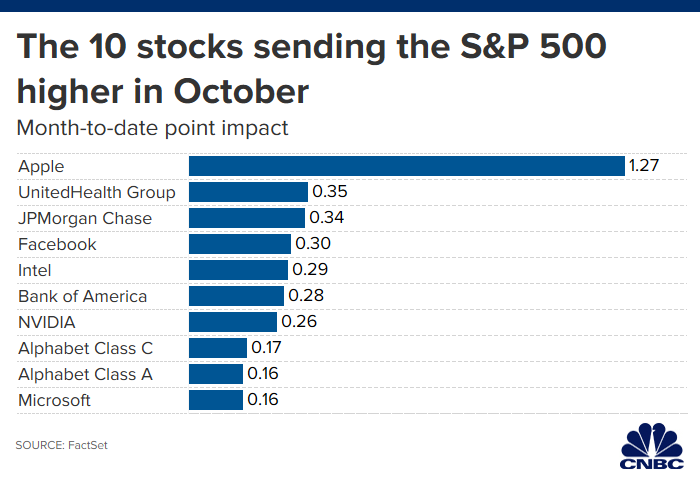
Bank stocks have benefited from a recent rebound in bond yields, while many of the technology stocks have gotten relief from optimism about trade negotiations in China. Companies like Apple and Nvidia have significant exposure to the trade war with China through supply chains and sales. Investors are also growing optimistic about Apple's iPhone sales. Apple reports earnings on Wednesday.
J.P. Morgan shares hit an all-time high on Friday, leading a pack of stocks setting records at the end of last week. Bank of America's stock hit its highest level since October 2018, while Western Union shares rose to levels not seen since September 2008.
Charter Communications, O'Reilly Auto, Illinois Tool Works and Sherwin Williams are a few other stocks that reached all-time highs on Friday. Both Phillips 66 and Valero traded at levels not seen since October last year.